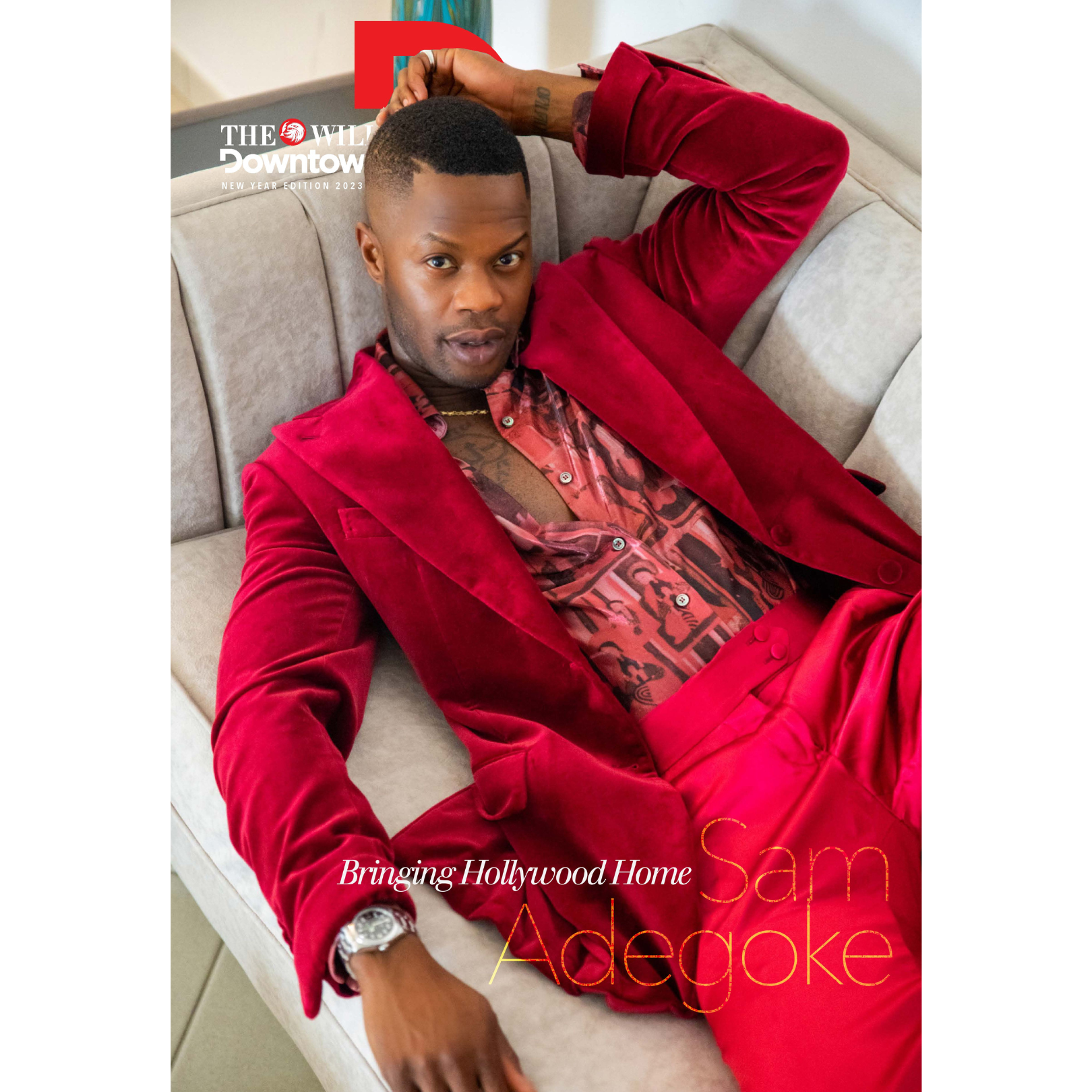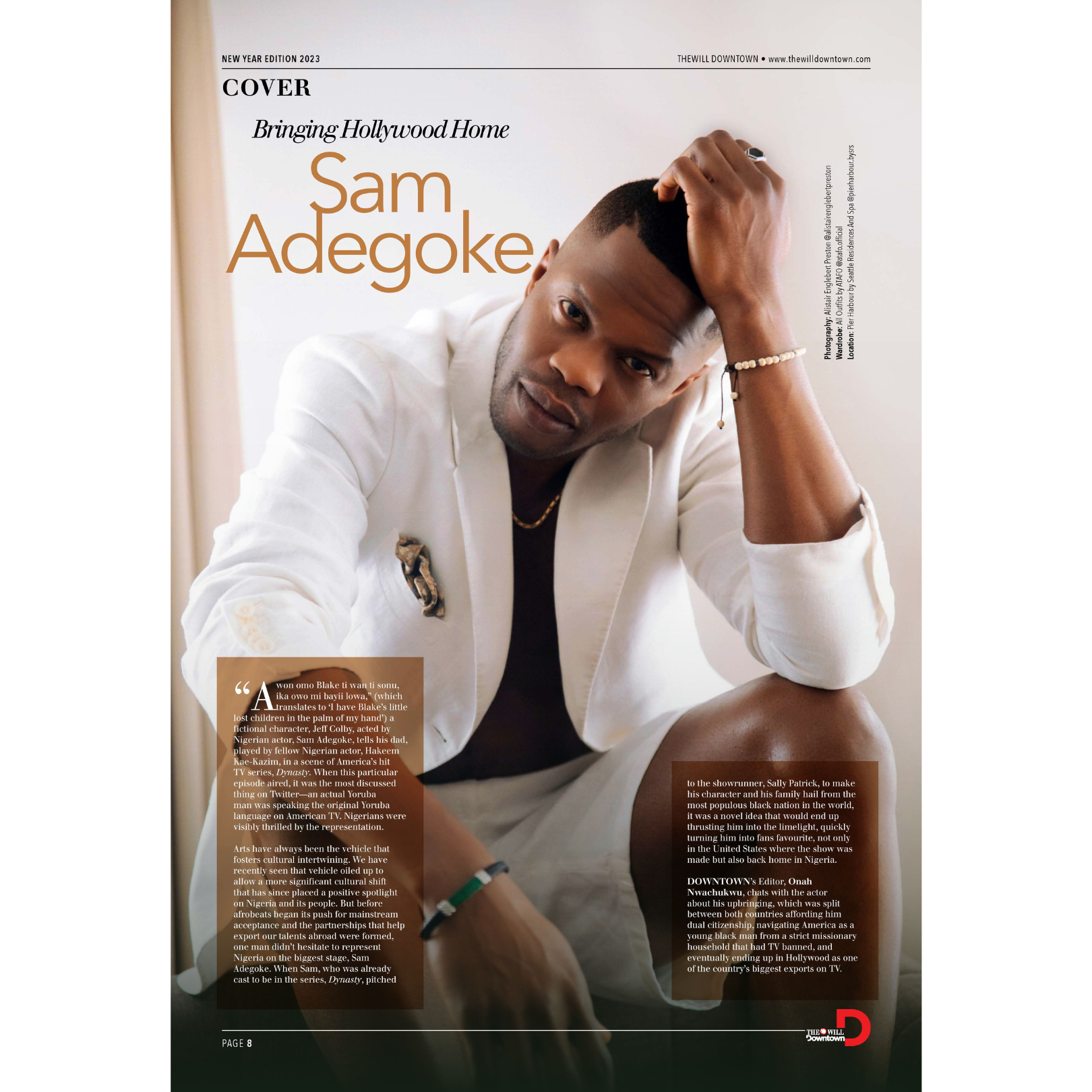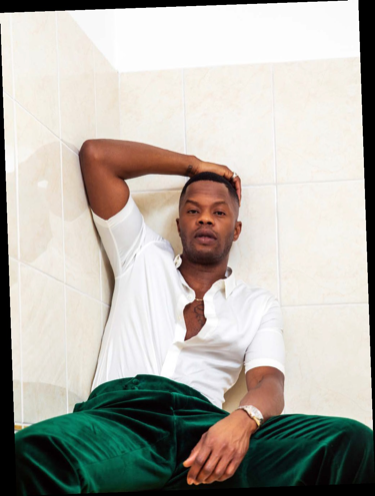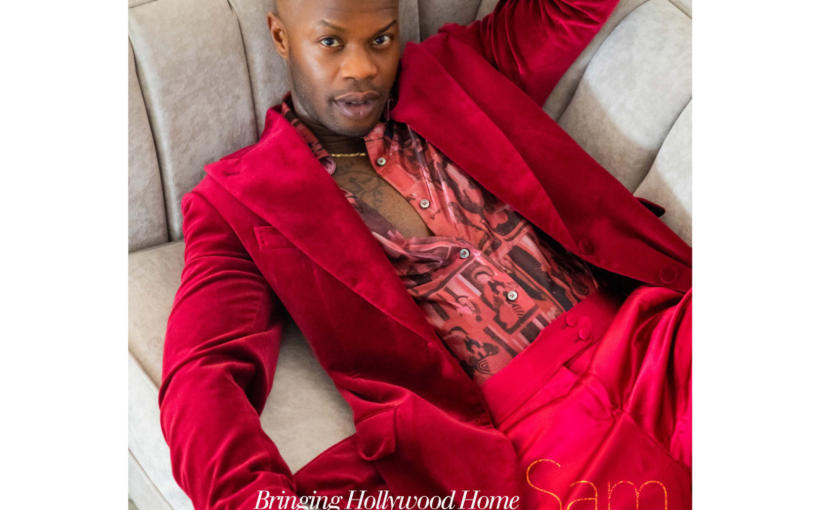
The cover star for TheWill Downtown’s new year edition is Nigerian-American actor Samuel Oluwaseyi Adegoke, best known for his role as the fictional character Jeff Colby in the American drama television series.
Sam Adegoke, as he is popularly known, was born in Lagos, Nigeria, and raised in St. Paul, Minnesota. His television credits include “Michael Jackson: Searching for Neverland,” as well as guest spots on “Code Black,” “Switched at Birth,” and “NCIS: Los Angeles.” He also recurred on the television series “Murder in the First.”
Sam discusses living in America as a Nigerian child, his parents’ reaction to his choice of career, inclusivity in Hollywood, featuring in the series “Dynasty,” and his story so far in this deeply insightful interview with Onah Nwachukwu.
Read excerpts from the interview below:
What was your parents’ reaction to you deciding that you wanted to act for a living?
They almost crucified me. I studied marketing and finance at business school. I worked in consumer insights and human resources, and the company I worked with—General Mills—moved me to LA (Los Angeles). The crazy thing is that I have a very artistic family. I have two brothers who can sit here and draw you. It will blow your mind. My sister sings and plays the piano in the church. I played the bass guitar in the church, and my brother Michael drummed. I always tell people we are like an African Jackson Five, but we did praise and worship in the church. Funnily enough, I enrolled in a theater arts program during my freshman year, but my eldest brother said, No, not in this house. Don’t study that. Study business or marketing. That’s what’s acceptable in this house.” And I worship my older brothers because they raised me when my parents were busy working in the church. I did. I did it for many years. And then I finally just said, “No, this isn’t really me.” So I cashed up my 401k, quit, and went to the Academy of Art in San Francisco. They have an art program there. And I didn’t even tell anyone. I studied menswear in theater because my uncle was a tailor in Nigeria, and I always liked to play around with clothes.
People knew I was doing that but didn’t know I was doing theater because it’s still like, “You’re going to move to LA and become an actor.” It just sounded cliche and stupid. And I’m grateful I didn’t tell anyone because they say, “A prophet is not without honor, save in his own country,” right? It’s usually those closest to you because they already know you in one light, and they’ll be the biggest voices of dissent towards your dreams, and they do it unknowingly. I would do the same if my brother showed up tomorrow and said he wanted to be a jazz musician. I would laugh and say, “Okay, you’re an engineer; that’s how your mind works.” I wouldn’t say it out loud, but I would think it in my head. So I just kept doing it.

What do you love about acting?
Contrary to my character on Dynasty and that show’s tone, acting is therapy for me. I mean, I jazz it up and make it sound sexy, but I remember, funny enough, my older brother, John, was the first one to start taking acting classes in LA. I was doing some runway stuff, dabbling around entertainment, and he invited me to the class he was taking in LA, in a studio theatre— Ivana Chubbuck’s class, to sit in on it. He’s like, ‘listen. I think there’s something here. I think you could do this. I’ve been doing this class for about four or five months.’ So I sat in on the class and watched my brother perform a scene with another scene partner. And I was like, ‘Who the hell?’ I didn’t know who this guy was. It was a deeply emotional scene, coming from a guy who was a part of a family of six very macho boys, so you can imagine my surprise. I had never seen this emotional side of my brother, and afterwards, I was like, ‘John, what the hell was that?’ And he didn’t have the language to articulate his experience. So I jumped into it and realised, ‘Oh, wow, this is therapy.’ There are some things we need to deal with— being Nigerian men, particularly, that we can embody within a character through which you kind of exercise these things. It’s not Sam crying and being moist; it’s the character. But you don’t realise you’re releasing stuff through that. And that became like a drug for me. I was like, ‘Okay, I’m learning more about myself outside of the professional side of Sam, the athlete outside of Sam, the man or whatever idea man is supposed to be. You’re discovering that for yourself. And that’s what I love most about it. It’s become therapy for me. It led me to do therapy myself with a formal therapist, which was a hilarious concept to me growing up. when I was younger, I thought, ‘why are you gonna pay a complete stranger to tell you about yourself?’ Like, ‘give me your money, and I’ll tell you everything about yourself.’ Now, I tell my brothers, ‘all you negroes need therapy. You guys need some things you got to work through.’ So it’s just beautiful, it’s being a child again, it’s make-believing, pretending and to do that for a living? God is good.

What was your very first role as a paid actor?
My first role was in a show called Wicked City on ABC.
Was it difficult getting the role considering that you are a black person in the US, or with the inclusiveness nowadays, was it that they were looking for a black character for that particular role?
They were. However, this was before what I call ‘the black renaissance’ in entertainment started happening, with Black Panther, Moonlight, and some of these amazing stories that pushed things forward. At the time, the roles available primarily to you were either gangster or slave, which was my first role. I played a drug dealer. But the way the role came about was ABC, speaking of being more inclusive, has a digital talent competition that they do. Every year, they take submissions from all across the US. 20,000 to 30,000 people submit. You do a series of dramatic and comedic scenes, selftaped, put it in, and they’ll let you know if you made it onto the next round. The idea of it is that they wanted to get more diverse casting in their programming. So I started doing it. The contest is called ‘ABC Discovers Digital Contests’, which happens annually. 2015 was, I think, the second or third year, but Lupita Nyong’o did it.
Several people I know, prominent actors and black actors, went through this program. I did it just as another way to work because, at the end of it, you could win a holding deal with ABC, and they’d give you 20 thousand dollars and have you meet with all their producers and showrunners and try to get you staffed on a show. I was like this is another opportunity to excel, and I kept going through the rounds. Then they told me I was a winner out of thousands of people. And before that, I was doing student plays, student projects, extra work, and whatever I could do to be there. And that’s kind of how the career took off. So through the program, I got the exposure that allowed a prominent agency and a management company to reach out and say, ‘Hey, we love your work. Congratulations on winning. Do you have representation?’ I signed with them; they sent me to my first audition, ABC’s Wicked City, and I booked that. They didn’t sign me immediately. It is a pretty major management company, so they’d rather try you out first. I kept working, and thankfully, I’ve just been working ever since, and I’ve been fortunate to do a pretty diverse array of roles that keeps it fun and exciting.
Read the full interview here.
The post Sam Adegoke Fronts TheWill Downtown Magazine’s New Year Edition appeared first on BellaNaija – Showcasing Africa to the world. Read today!.
Source: BellaNaija



